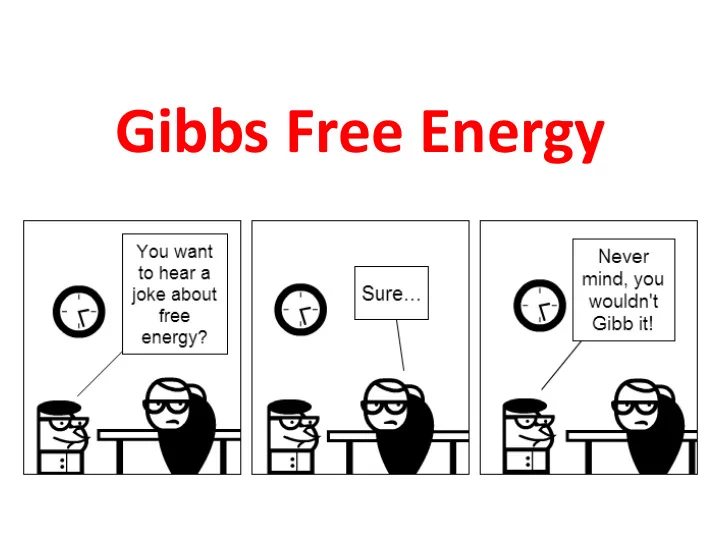

Gibbs Free Energy
What is free energy? • Amount of available energy to do work • Equation for Gibbs free energy: ∆G = ∆H - T∆S
∆G = ∆H - T∆S • ∆G – change in Gibbs free energy • ∆H – change in enthalpy (total energy of a system) • T – temperature in Kelvin (°C + 273) • ∆S – change in entropy (measure of disorder of a system)
Spontaneous Reaction • A “spontaneous” reaction means that the reaction is thermodynamically capable of happening (reacting) • It DOES NOT mean “quickly”
What does a change in Gibbs free energy (∆G ) mean? • If ∆G is less than 0, then the reaction will release energy ( exergonic ) – reactions occur spontaneously • If ∆G is greater than 0, then the reaction absorbs energy ( endergonic ) – reactions do not occur spontaneously • If ∆G is equal to 0, then the system is at equilibrium
Coupled Reactions (Watch this 6 minute Bozeman Video on Coupled Reactions) • One reaction is used to power another reaction OR • The transfer of energy from an exergonic process to an endergonic process
Cellular Respiration • Exergonic reaction • ∆G = - 686 kcal/mol of energy • ∆G < 0 , the reaction releases energy when glucose is metabolized
Photosynthesis • Endergonic reaction • ∆G = 686 kcal/mol of energy • ∆G > 0 , the reaction absorbs energy from the sun and stores the energy in the chemical bonds of glucose
Synthesis of ATP • ADP + P i → ATP • Endergonic • ∆G = 7.3 kcal/mol of energy • ∆G > 0, the reaction absorbs energy when ADP is bonded to inorganic phosphate to produce ATP
Hydrolysis of ATP • ATP → ADP + P i • Exergonic • ∆G = - 7.3 kcal/mol of energy • ∆G < 0, the reaction releases energy when the terminal (last) inorganic phosphate is removed from ATP to produce ADP
ADP + P i ATP
Recommend
More recommend